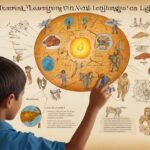Round Rock Journal – In the journey toward personal growth, few skills are as transformative as learning how to build self-awareness. It’s the cornerstone of emotional intelligence, resilience, and authentic living. When you truly understand your thoughts, emotions, and behaviors, you gain the ability to shape your life with purpose rather than drifting through it. Self-awareness isn’t about self-criticism it’s about self-connection. By observing how you think, react, and make decisions, you uncover patterns that either serve your growth or silently hold you back. Developing this awareness allows you to respond to life thoughtfully, not just impulsively.
As psychologist Daniel Goleman once said, “Self-awareness is the foundation of emotional intelligence.” Without it, personal growth becomes a guessing game. With it, every challenge becomes an opportunity for insight and transformation.
“Read also: How Emotional Intelligence Shapes Personal and Professional Growth“
Recognizing the Layers of Self-Awareness
Building self-awareness involves peeling back multiple layers what you see on the surface is often shaped by what lies beneath. The first layer is internal awareness, which involves understanding your values, strengths, weaknesses, and motivations. The second is external awareness, where you recognize how others perceive you. Both layers are essential: one guides your inner alignment, while the other helps you navigate relationships and environments effectively.
For instance, you might think you’re confident, but others may see you as intimidating. This gap between perception and intention highlights an opportunity for self-reflection. To bridge that gap, you must stay curious about feedback rather than defensive. True awareness is not about always being right it’s about being willing to understand yourself from every angle.
The Role of Reflection in Building Awareness
Reflection is the most powerful tool in learning how to build self-awareness. It creates space for you to pause, think, and make sense of your experiences. Journaling, meditation, and mindful observation are proven methods to enhance this process. When you write your thoughts daily, for instance, you can trace emotional patterns that would otherwise go unnoticed.
Moreover, reflection encourages self-compassion. Instead of judging yourself for mistakes, you start to see them as lessons. Neuroscience supports this: regular self-reflection activates the prefrontal cortex the part of the brain responsible for conscious decision-making. In other words, by reflecting, you’re literally rewiring your brain to make more intentional choices.
Embracing Feedback as a Growth Tool
One of the most challenging yet essential aspects of self-awareness is learning to accept feedback. Often, what we can’t see about ourselves is visible to others. Friends, mentors, or colleagues can act as mirrors, reflecting aspects of our behavior that we might overlook. To build self-awareness, it’s crucial to approach feedback with openness rather than resistance.
Instead of seeing feedback as criticism, reframe it as valuable data for personal growth. Ask clarifying questions and look for recurring themes if multiple people mention the same issue, it’s worth exploring. Remember, self-awareness grows not from comfort but from courage the courage to face truths that might initially unsettle you but ultimately free you.
Mindfulness: The Heartbeat of Awareness
At its essence, mindfulness is the practice of being fully present. It helps you notice your thoughts and emotions without being consumed by them. When you practice mindfulness regularly whether through breathing exercises, meditation, or simply observing your surroundings you train your mind to stay grounded in the present moment.
This mental clarity prevents emotional overreactions and improves decision-making. Studies have shown that individuals who practice mindfulness exhibit higher levels of empathy and emotional regulation. Personally, I’ve found that just five minutes of mindful breathing before a stressful meeting can shift my mindset from anxious to focused. Over time, mindfulness transforms from a technique into a lifestyle a way of perceiving life with awareness and intention.
Identifying Emotional Triggers and Patterns
A crucial step in developing self-awareness is recognizing what triggers your emotions. Triggers are like mirrors they reveal unresolved feelings and core beliefs. For instance, if criticism from others instantly makes you defensive, it might indicate a deeper need for validation. By identifying these emotional patterns, you can respond consciously rather than react impulsively.
One practical exercise is to pause whenever you feel an intense emotional response and ask, “What is this feeling trying to tell me?” This simple question turns emotional turbulence into a moment of learning. Over time, you’ll notice that awareness doesn’t necessarily make emotions disappear it simply gives you control over how you express them.
Aligning Actions with Values for Authentic Growth
True personal growth happens when your actions align with your core values. Self-awareness helps you clarify what those values are. Many people chase goals defined by others status, approval, or material success without realizing they’re neglecting what truly matters to them. When you build self-awareness, you start making decisions that resonate with your authentic self, not societal expectations.
For example, if one of your core values is connection, yet your career keeps you isolated, you might feel unfulfilled despite external success. Recognizing this misalignment gives you the power to make changes that restore balance and purpose. Growth, then, becomes less about achieving more and more about becoming whole.
“Read also: How Minimalism Became the Lifestyle Movement That Changes Everything“
The Connection Between Awareness and Emotional Intelligence
Self-awareness and emotional intelligence are deeply intertwined. Emotional intelligence (EQ) begins with the ability to identify and understand your emotions before you can manage them or empathize with others. By improving self-awareness, you enhance every other component of EQ self-regulation, motivation, empathy, and social skills.
This connection is particularly valuable in leadership and relationships. Leaders who possess high self-awareness are more adaptable, empathetic, and trusted. In relationships, it prevents miscommunication and nurtures deeper emotional intimacy. The more aware you are of your internal world, the more harmoniously you can connect with the world around you.
Practical Ways to Build Self-Awareness Daily
Building self-awareness doesn’t happen overnight it’s a lifelong process. However, consistency matters more than perfection. You can start with small, actionable habits:
- Journal for 10 minutes every night to track thoughts and emotions.
- Ask for feedback regularly and reflect on it without defensiveness.
- Set mindfulness reminders throughout your day pause, breathe, and notice.
- Name your emotions when they arise instead of suppressing them.
These practices act as daily anchors that keep you connected to yourself. The key is to stay curious. Curiosity transforms self-awareness from an obligation into an exploration a journey of discovering who you are and who you’re becoming.
The Journey Toward Conscious Living
Learning to build self-awareness is not a destination it’s an ongoing dialogue with yourself. It invites you to live consciously, embrace vulnerability, and grow from experience. Each reflection, each realization, brings you closer to authenticity.
In a world that often demands distraction and speed, self-awareness asks you to slow down to listen, observe, and understand. It’s through that stillness that true growth unfolds. When you know yourself deeply, you no longer chase success to prove your worth you create success that reflects your truth.


